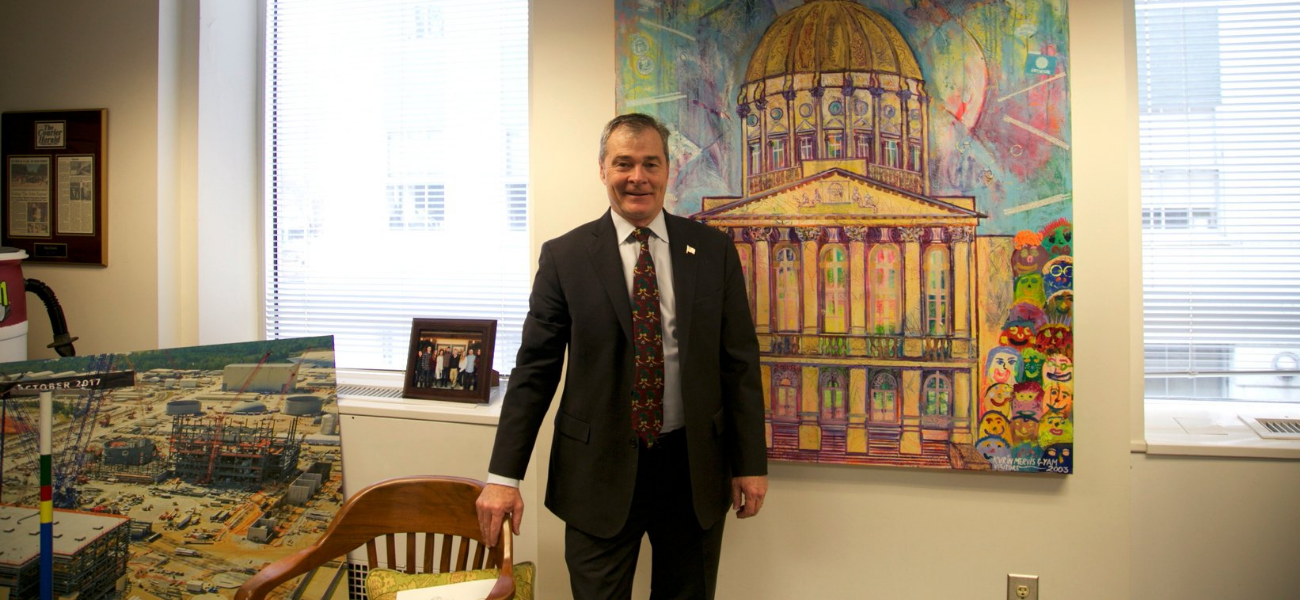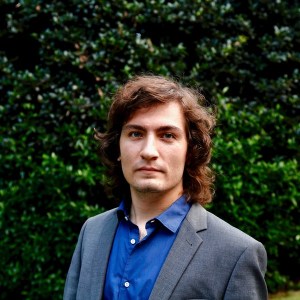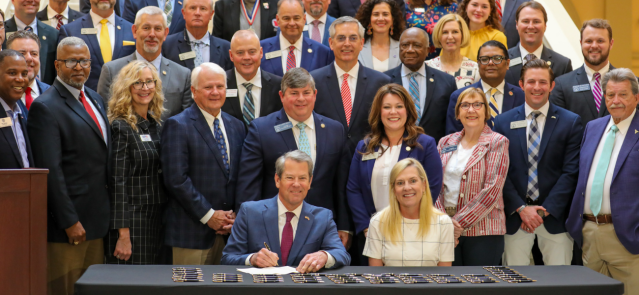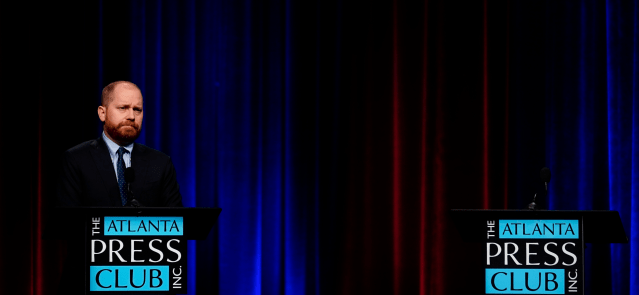Stay ahead of the curve as a political insider with deep policy analysis, daily briefings and policy-shaping tools.
Request a DemoMeet Tim Echols, Vice-chairman of the Georgia Public Service Commission

Photo Credit: Alessandro Marazzi Sassoon
- Playmaker: Tim Echols
- Role: Vice-chairman of the Georgia Public Service Commission
- Tenure: January 2011 - present
Tim Echols could be running a Chick-Fil-A restaurant in Texas right now. Instead, he’s the vice-chair of a powerful state regulatory agency that keeps watch over big gas-and-electric companies like Georgia Power.
Echols is entering the last year of his second term representing his Athens-area district of the Georgia Public Service Commission (PSC), an oft-overlooked part of state government that regulates public utilities from energy to telecom. The commission can conduct investigations, gather evidence, inspect properties and records of regulated companies as well as set rates. It has an annual budget of just over $10 million.
In his elected role at the PSC the Republican, who is running for a third term, has championed solar power and electric vehicles. He also created the Clean Energy Roadshow, an annual traveling showcase of sustainable technologies across the state. During his time on the commission, Georgia went from being ranked 34th in solar energy production to being ranked 4th among states by 2024. In his office, a solar thermal panel has been converted into a coffee table.
State Affairs sat down with Echols for a conversation about his life, career, and views at his office near the State Capitol in Atlanta just as Gov. Brian Kemp announced that Electric Vehicle manufacturer Rivian would set up shop in Georgia. His responses have been edited for length and clarity.
What is the professional path that led you to your current role?
Echols's experience with leadership began at North Clayton High School where he was student council president.
“I really wanted to be a leader in our state,” he said. Through the Georgia Association of Student Councils, he met other student leaders. “I really got to know fellow student council presidents and vice president around the state. It gave me a good look at how diverse Georgia was both geographically, economically, racially, and allowed me to learn how to work with people that may be a little bit different than me, how to collaborate to get things done.”
“That experience whet my appetite for future leadership,” he said. Echols graduated from the University of Georgia, became engaged and remained fixed on his goal of running for office. At 21, he said, he declined an offer from Chick-Fil-A founder S. Truett Cathy, to run a location in Texas.
“I didn't want to leave the state of Georgia because I was going to be running for office… It was just a matter of timing,” he said.
Echols went on to earn two master's degrees from the University of Georgia, one in public relations and another in nonprofit organizations. He created a conservative leadership charity called TeenPact that took high school students to the state capitol to meet legislators, the governor, lobbyists, and journalists during legislative sessions.
“Rather than take them into a hypothetical world or bring them to the Capitol in the summer, when it is basically an empty museum, we bring them here when everything's happening, let them see all the inner workings that are required to get things done,” he said.
“I spent most of my adult life building that organization and then at age 50, the seat on the Public Service Commission opened up. I would probably never challenge a sitting incumbent because it's very difficult to beat incumbents in any elected office, so I waited for a seat to open up, a seat that I felt I could win.”
Was there a defining moment in your life or career that helped guide you to this role?
“I've always been a person interested in innovation. And even before I took office, I had a natural gas Honda Civic. So, I've been interested in energy efficiency and stewardship of the environment. And it seemed like a good fit for me, and I had no idea that the seat was going to be available and when it did become available, my wife and I prayed about it, and felt like, you know, this is something that not only might we win, but we would enjoy serving in that role.”
What accomplishments are you most proud of in your time on the commission?
“When I took office Georgia had about four megawatts of solar, having us really towards the back in the nation… and we have substantially changed that. By 2024, we will be fourth in the nation.”
As of 2020, Georgia has over 2,400 Megawatts of Solar power capacity installed.
Echols also championed the institution of “net metering,” the practice by which businesses or homes with solar panels installed can sell back excess energy to the grid. The PSC began a net-metering pilot program in 2019. “It’s been mostly successful,” he said.
An avid fan of electric vehicles (on his sixth, currently), Echols is also proud of the Clean Energy Roadshow, it’s a showcase for innovation around the state, now in its 11th year where he promotes EVs and other technologies.
“We take this every year to Savannah, every year to Atlanta, all the other cities are negotiable… We have seen companies and cities and counties make decisions to implement a part of what we're suggesting,” he said. For example, he says, UGA has expanded their fleet of electric buses.
What challenges and criticism have you faced during your time in leadership?
“I think in my first reelection, in 2016, I was heavily criticized for my support of electric vehicles. All that's changed now with the state embracing the SK Innovation factory and now today, an announcement of the Rivian electric truck plant, so what a difference five years makes.”
“I was out early on these electric vehicles and the state is coming around, and trucks are really a key to this for Republicans.”
“I think if it was just another little subcompact car, we probably would not be having the kind of Republican support that we're getting for these truck factories and these truck batteries,” he said. "It wouldn't surprise me if we see some other favorable electric vehicle public policy to come out of the General Assembly. And I would directly credit the SK factory and the Rivian plant for really causing legislators to feel like wait a second, this technology is in our backyard. We've got to make good for these guys.”
Are you putting conservation or environmentalism into a conservative mindset?
“I wouldn't call it environmentalism, I would say that it would be stewardship, environmental stewardship,” he said.
“My faith is really important to me. I'm an evangelical Christian. I have seven children. We homeschool our kids… I’m ultra-conservative. But it seems I've been out ahead of my conservative colleagues when it comes to these environmental issues and I've tried to make it clear to them: look, these are environmental issues, but we are doing this in a red-state type of way.”
“Coming out of the 2000’s to mid-2010’s Republicans had a bad taste in their mouth about solar, for whatever reason. Maybe it was the Solyndra subsidy and the bankruptcy of Solyndra, I'm not sure. But we've had to win them over on this and we clearly have won them over on solar. There's no hesitation now in the Republican Party to embrace solar.
“They've seen that these large arrays boost county budgets that boost the tax digest. It helps really the poorest counties in our state because that's the place where the land is the cheapest and the flattest. And so the solar arrays have gravitated to this very poor part of Middle and South Georgia. And it has been a real godsend to these communities.”
What are your plans for what you want to accomplish going forward? A third term?
“I want to continue to promote constructive solar policies. I want to see the electric vehicle tax credit returned to our state. That's a legislative decision,” he said.
“I want to continue to bring my conservative ideology to the environment and to renewable energy and do it in a way that's measured, that maybe a little slower than a state like California or New York might do. But nevertheless, it is deliberate. It's proactive and it's moving in the right direction. We're just a little more careful about how we do it.”
And that includes nuclear as well?
“According to President (Joe) Biden, according to even President (Barack) Obama, and I met with the climate czars that President Obama had in the White House and their comment to me even back in 2014 was without existing and new nuclear, the U.S. could never meet his 2050 climate goals.”
“Nuclear energy is embraced really by the mainstream of both political parties and look no further than the infrastructure bill that President Biden signed.”
Echols has represented the U.S. at several World Nuclear Exhibition, and recently traveled to France where this year’s expo was held in Paris.
“I am pro-nuclear… we need to recycle the waste, just like the French do. But in the meantime, Georgia needs nuclear energy online, especially if there will be a tax on carbon in the future because we're gonna need it to offset the fossil plants.”
Who should we profile next? Share your thoughts/tips by emailing [email protected].
Read this story for free.
Create AccountRead this story for free
By submitting your information, you agree to the Terms of Service and acknowledge our Privacy Policy.
Global bird flu disrupts Georgia exports, costing chicken producers millions
ATLANTA — A global bird flu that has rapidly spread from birds to dairy cows, milk supplies and humans has cost untold millions of dollars in lost export business in Georgia, the nation’s leading poultry producer, officials with the state Department of Agriculture and poultry industry said. Georgia has had only three reported cases of …
Is it safe to eat chicken and eggs and drink milk? Answers to your most pressing questions about the latest bird flu outbreak
A two-year-old strain of bird flu has heightened concerns in Georgia and the rest of the country after the virus recently spread to dairy cows. Here’s what you need to know about the virus and its impact on Georgia and the rest of the country. What are the symptoms of this flu in humans? Eye …
Kemp signs bills on education, health care, taxes
Gov. Brian Kemp signed a slew of bills over the past week or so, including the private school voucher bill long sought by Republicans and a bill that will ease regulations over the construction and expansion of medical facilities in rural areas. His bill-signing events were clustered into themes: education, health care, military members, human …
Incumbent candidates for local, federal races likely to be no-shows at this weekend’s primary debates
ATLANTA — One of Georgia’s prominent media organizations is pleading with incumbent state and congressional candidates to participate in its primary election debates slated for Sunday.
For the first time in The Atlanta Press Club’s 30-year debate history, incumbents facing challengers in the May 21 primary have either declined or not yet committed to participating in the organization’s well-known debate series. The possible no-shows include candidates in four Congressional races as well as the Georgia Supreme Court, and the Fulton County District Attorney races.
“This is the first time that we’ve had so many [incumbents] not participate,” debate organizer Lauri Strauss told State Affairs. Strauss declined to speculate why candidates aren’t participating.
Hoping to encourage more participation, the organization issued the following statement:
“The Atlanta Press Club believes it is the responsibility of people running for public office to answer questions from their local media that will help inform voters before they cast their ballots. If a candidate is running for public office, the candidate should be willing to participate in the democratic process, which includes attending debates and fielding questions from journalists and opponents.”
Candidates have until Friday to RSVP.
Strauss said candidates who fail to appear will be represented on stage by an empty podium during the debate.
District Attorney Fani Willis has declined to participate and Democratic U.S. Reps. Lucy McBath and David Scott have yet to RSVP. Strauss said the organization is still in talks with Georgia Supreme Court Justice Andrew Pinson’s staff about his appearance in the debate.
Willis, declined earlier this week to participate, citing constraints around talking about sensitive cases like the criminal prosecution of former President Donald Trump.
McBath currently represents the 7th Congressional District and is now running in the newly drawn 6th Congressional District against two Democratic challengers, Jerica Richardson and Mandisha Thomas. McBath declined to participate in the press club’s general election debate in 2022, forcing her Republican challenger Mark Gonsalves to debate with an empty podium. McBath won with 61% of the vote.
The debates will air live on April 28 on GPB.org, on The Atlanta Press Club’s Facebook page (www.fb.com/TheAtlantaPressClub). It will be rebroadcast in early May on WABE.org.
| Race | Tape and Livestream Sun. April 28 |
GPB-TV Broadcast | WABE Broadcast |
| Congressional District 6 Democrats | 10:00 a.m. | April 29 at 7:00 p.m. | May 1 at 4:30 p.m. |
| Congressional District 13 Democrats | 11:15 a.m. | April 28 at 4:00 p.m. | May 1 at 5 p.m. |
| Congressional District 3 Republicans | 1:00 p.m. | April 28 at 5:00 p.m. | May 2 at 3:30 p.m. |
| Congressional District 2 Republicans | 3:00 p.m. | April 29 at 5:00 p.m. | |
| Georgia Supreme Court | 4:45 p.m. | May 2 at 4:30 p.m. | |
| DeKalb County CEO | 5:45 p.m. | May 2 at 5:15 p.m. | |
| Fulton County District Attorney | 6:45 p.m. | May 1 at 4 p.m. |
Have questions or comments? Contact Jill Jordan Sieder on X @journalistajill or at [email protected] and Tammy Joyner on X @lvjoyner or at [email protected].
And subscribe to State Affairs so you do not miss an update.
X @StateAffairsGA
Instagram@StateAffairsGA
Facebook @StateAffairsGA
LinkedIn @StateAffairs




